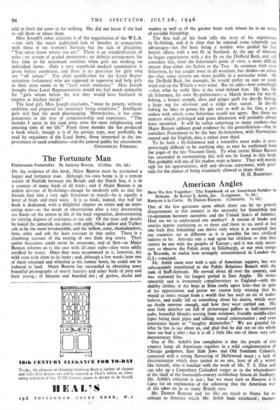The Fortunate Man
Fisherman Naturalist. By Anthony Buxton. (Collins. 10s_ 6d.)
ON the evidence of this book, Major Buxton must be accounted a happy and fortunate man. Although his own home is in a remote corner of Norfolk between the Broads and the North Sea, it is in a country of many birds of all kinds ; and if Major Buxton is an ardent devotee of fly-fishing—though he modestly tells us that his friends find him a very ugly fisherman to watch—he is equally a lover of birds and their ways. It is to birds, indeed, that half his book is dedicated, with a delightful chapter on otters and an inter- esting note—as the result of observations after a very devastating sea flood—of the return to life of the local vegetation, demonstrating its varying degrees of resistance to sea salt. Of the trees and shrubs he found the tamarisk, tea plant, crab apple, black sallow and Turkey oak to be the most invulnerable, and the willow, osier, rhododendron, lime, elder and ash the least resistant in that order. There is a charming account of the rearing of two little dog otters. Their native fierceness could never be overcome, and at first—as Major Buxton informs us is the case with all otter cubs—they were oddly terrified by water. Once they were accustomed to it, however, the wild soon took them to its heart ; and, although a few weeks later one of them returned and whistled to his former hosts, he could not be induced to land. Major Buxton has succeeded in obtaining some beautiful photographs of marsh harriers and other birds of prey and their young ; of bitterns and bearded tits ; of grebes, ducks and
waders as well as of the garden birds with Whom he is on terms of enviable friendship. The first half sof his book tells the story of his experiences in fly-fishing, and it is clear that he enjoyed some relatively rare advantages—not the least being a mother who guided his first boyish efforts with a wet fly in Scotland. At the age of nineteen he began experiments with a dry fly on the Driffield Beck, and still considers this, from the fisherman's point of view, a more difficult stream than either the Itchen or the Test. In common with most fishermen, he has caught trout in all weathers, but thinks—as others do—that some streams are more prolific in a particular wind. On the Driffield Beck, for example, he would prefer an east or south wind and on the Wharfe a west wind. But he adds—how consolingly —that what he really likes is the wind behind him. He has, like all fishermen, his own fly-preferences--a March brown for wet-fly fishing, a brown nymph, olive and ginger quill for dry-fly fishing, a large nip for sea-trout and a sedge- after sunset. In dry-fly fishing he likes to grease his gut cast as well as his line, a pro- cedure with which scme fishermen would not agree. But these are matters which prolonged and grave discussion will probably always leave unsettled. It will be rather surprising to many readers—but Major Buxton adduces good evidence for his generalisation—that he considers Frenchmert to be the best fly-fishermen, with Norwegians second and the English, alas, a rather poor third.
To be both a fly-fisherman and a naturalist must make it over- poweringly difficult to be anything else, as may be confirmed from the pages of the late Viscount Grey. To what extent Major Buxton has succeeded in surmounting this will not be found in this book. Nor probably will-any of his readers want to know. They will merely sigh for his opportunities, skill and obvious enjoyment, with grati- tude for the chance of being vicariously allowed to share them.
H. H. BASHFORD.






























 Previous page
Previous page